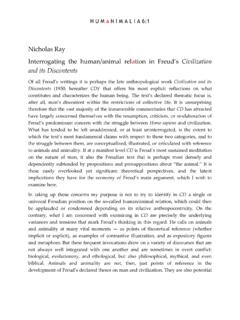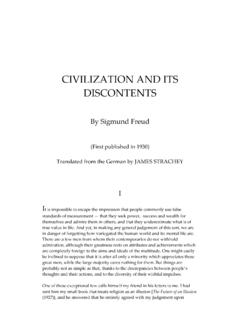Transcription of Civilization VI and its Discontents - alexwellerstein.com
1 Civilization VI and its Discontents : Review of Sid Meier s Civilization VI (2016)Alex WellersteinStevens Institute of Technology, United StatesIn the argot of gaming, Civilization is a turn-based strategygame, in which the player has the task of managing anemergent Civilization in a zero-sum world where only onecivilization may truly rule all. The player does this byfounding cities, developing science and technology, andproducing units of commerce, culture, and war. Each gamein the twenty-five-year-old franchise, with the latest beingCivilization VI (released in October 2016), refines theunderlying model only somewhat, adding in new dynamics(for example, religion and culture), and either eliminatingor modifying VI and its predecessors are games thatpurport to model history.
2 That is to say, they are imbuedwith a historicist ethos: one s scrawny settlers begin on anundeveloped, uncivilized continent, with limitedresources and capabilities, and broadly, over the courseof thousands of in-game years, expand to eliminate bar-barians, develop modern science and technology, createvast empires, and, nearly inevitably, snuff out or assimi-late other analytical frames familiar to historians contrib-ute to in-game dynamics. For example, religious beliefsimbue civilizations with various properties (for example, Work Ethic increases economic productivity, while Tithe brings in extra gold); choices of government canopen up other possibilities (a Merchant Republic increases the number of trade routes, while Fascism increases one s military capabilities).
3 The main driver ofcivilizational progress is science and technology, which isencompassed by a vast technology tree of branchingpossibilities, fueled by an amount of research points generated by the Civilization (which can be increased,predictably, by building universities, despite the fact thatresearch universities are a rather new development overthe scale of history traversed). Cities are the engines ofcreation in Civilization , as they generate a certain amountof productivity per turn which can be used to buildinstitutions, infrastructure, or individual units that con-tribute to economic activity ( , a worker can buildfarms and mines), but more often are engines of war( , archers in early eras, tanks and battleships in laterones).There are five modes of victory in the latest game, andthey give a sense of the historical imagination implicit inits design.
4 Domination Victory involves capturing thecapitals of other civilizations (in my head this is the HitlerVictory ). Religion is an in-game mechanic, and can bespread to other civilizations by means of priests and Inqui-sitors. If ones religion becomes adopted by every othercivilization, one wins a Religious Victory ( Sharia Victory, perhaps). Culture is an in-game currency of sorts, and ifone manages to sufficiently spread one s culture to othernations, and attract the largest amount of tourists, one canwin a Cultural Victory ( Disney Victory ?). For those whofind all of those options unappealing, there is also a ScienceVictory, which involves building a space ship and flying toMars (I think of it as a Musk Victory ; it is not clear whyflying to Mars makes one a civilizational winner ).
5 Even inan extremely long game, no single player may manage toaccomplish any of these possibilities, so there are alsopoints and one can win a fairly uninspiring victory thisway. In a previous edition of the game, it was possible to geta United Nations to elect one s nation to a King of theWorld sort of position, but any option to win democraticallyor diplomatically was removed from the most recent edi-tion, along with the United Nations or what is the agent in Civilization meant to be?Human players are represented by a historical avatar ofthe country one chooses (Queen Victoria for England;Gandhi for India; Gilgamesh for Sumeria), but one wieldsmore power than any particular historical figure (legend-ary or not). Players simultaneously micro-manage theproduction quotas of individual cities, the tenets of reli-gions, and the prosecutions of wars, all over the course ofmultiple millennia.
6 One can adopt Fascism or Democracywith equal ease, and it has only the effect of changing a fewsettings. One can, incredibly, choose what scientific discov-eries will be developed by the Civilization , a level of controlthat would have made Bernal weep with joy. One isnot, clearly, meant to model any human being, and yet onealso lacks the power of a true god (at least, if one is a god,one is a god located very much in the details who concernshimself whether a city has a zoo or an aqueduct).After some thought, I have, I believe, identified who theplayer really is: Hegel s Geist of the age, guiding civiliza-tion through history along strictly teleological lines to-wards whatever kind of outcome (victory) one thinks isappropriate, one mouse click at a this sense of teleology is what makes the game soproblematic and tedious from a historical point of view.
7 It isa game whose idea of history is technological deterministat its core (for all of the other mechanics, the technologicaltree is the one that decides who lives and who dies), andyou, the Geist, are always the one who determines whichtechnological paths are pursued. All technological pathsultimately converge, but in the meantime the difference inpaths chosen by the players will determine who firstinvents gunpowder, or long-range navigation, or all technologies lead to new military units or to mili-tary upgrades, but many do, especially towards the mod-ern end of the technological tree. The teleological anddeterministic nature is explicit: there is no mystery aboutBook reviewEndeavour Vol. 41 No. 1 Available online 13 February 2017 Full text provided by 0160-9327/ technologies lead to what outcomes, and the playercan literally click on a future technology (say, nuclearweapons ) and automatically have the next twenty re-search breakthroughs queued up in the most of these path dependencies, no doubt for gameplaypurposes, are historically dubious.
8 One invents bureau-cracy well after agriculture and irrigation. Thermonuclearweapons can come only after the invention of lasers,whereas in reality these were entirely separate (workinglasers were not developed for nearly a decade after the firstthermonuclear weapons were set off). There are clearissues of balance associated with technologies like real-life nuclear weapons: they are, to use the jargon of gamers, overpowered. Real nuclear weapons make for poor game-play. And for the record, history itself was not that fun of agame for most players, are also almost no individuals in the Civilizationgames. There are the aforementioned avatars of othernations, such as Gandhi, who represents India no matterwhat time period or what policies it pursues (and theGandhi in the Civilization series is an aggressive, destruc-tive warlord, the remnant of a bug in an early edition of theseries that has been maintained for its humorous diversionfrom reality), but all other people are abstracted as num-bers and occasionally as sources of demands (the cityinhabitants have no capacity for self-governance and areutterly helpless for even the most mundane decisionswithout the player s intervention).
9 Starting with Civiliza-tion V, there have been Great individuals (Great Engi-neers, Great Scientists, Great Admirals, etc.), who appearif a Civilization reaches sufficient cultural and economicconditions. These individuals, however, serve only a limit-ed purpose: in most cases, they are spent (sacrificed, itseems) to create a cultural artifact that benefits the civili-zation in some way. In other cases, they simply hangaround and give minor bonuses to nearby units ( , aGreat General helps any other warriors he or she isaround). So much for the Great Man theory of VI undoubtedly has a veneer of history every Civilization has a unique military unit that the in-game Civilopedia describes in detail (with varyingdegrees of historical accuracy), and one is treated to agreat deal of pomp about one s civilizational goals butthe veneer is derived from a 19th-century conception ofhow history works.
10 As such its value for actual education is,I suspect, very limited. Perhaps a player would leave sucha game with a few details about the limitations of a rockslinger versus an archer, but they d also likely pick up anoutdated, deeply flawed model for thinking about histori-cal change. Of course, there are those who would dismisssuch concerns as pedantic ( it s only a game! ) but ifCivilization is going to drape itself in the appearance ofhistory, it becomes a target for historical criticism (acriticism no one would be tempted to heap onto, say, Worldof Warcraft).Science, technology, and war are at the core of Civiliza-tion VI. War isn t hell in this game, but it is tedious, slow,and expensive. This is perhaps an improvement over pre-vious versions in the series, where war was more of a romp,but it makes for a dull run of things.









